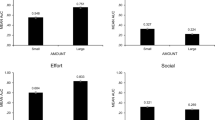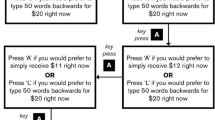Abstract
Discounting occurs when the subjective value of an outcome is altered because the outcome is delayed or uncertain. Previous research has suggested that how individuals discount delayed gains is related to executive functioning. The present study attempted to extend this relationship to discounting of probabilistic gains and losses, and to examine whether diminishing cognitive resources would impact how participants discounted monetary outcomes. In Experiment 1, university students completed an executive function measure and then a probability-discounting task that involved the hypothetical sum of either $1,000 or $100,000 framed as either a gain or a loss. The executive function of organization was a significant predictor of how participants discounted all four outcomes while motivational drive predicted discounting of losses, but not gains. In Experiment 2, participants completed the same measures with the addition of an ego-depletion task to deplete cognitive resources before making discounting decisions. The executive function of motivational drive and empathy were significant predictors of how participants discounted both loss outcomes. The results suggest that discounting of monetary outcomes is related to the executive function of organization for gains and motivational drive, and empathy for losses. They also support the notion that the discounting of gains may be a distinct process from the discounting of losses.
Similar content being viewed by others
Notes
Total score on the EFI was not used as a predictor variable because this score was highly positively correlated (all rs ≥ 0.583) with all of the subscale scores, which was not the case with the subscale scores, and beta weights become unreliable when highly correlated predictors are entered into the same model (Knight 1984).
A similar argument could be made for the magnitude effects (Thaler 1981) observed in the present study (i.e., more probability discounting of $100,000 than $1,000) because the direction of the magnitude effect differs between delay and probability discounting.
References
Beck, R. C., & Triplett, M. F. (2009). Test-retest reliability of a group-administered paper-pencil measure of delay discounting. Experimental and Clinical Psychopharmacology, 17, 345–355. doi:10.1037/a0017078.
Dixon, M. R., Marley, J., & Jacobs, E. A. (2003). Delay discounting by pathological gamblers. Journal of Applied Behavior Analysis, 36, 449–458. doi:10.1901/jaba.2003.36-449.
Du, W., Green, L., & Myerson, J. (2002). Cross-cultural comparisons of discounting delayed and probabilistic rewards. The Psychological Record, 52, 479–492. Retrieved from http://psych.wustl.edu/lengreen/publications/Cross-cultural%20comparisons%20of%20discounting%20delayed%20and%20probabilistic%20rewards%20%282002%29.pdf.
Estle, S. J., Green, L., Myerson, J., & Holt, D. D. (2006). Differential effects of amount on temporal and probability discounting of gains and losses. Memory & Cognition, 34, 914–928. Retrieved from http://psych.wustl.edu/lengreen/publications/Differential%20effects%20of%20amount%20on%20temporal%20and%20probability%20discounting%20of%20gains%20and%20losses%20%282006%29.pdf.
Green, L., & Myerson, J. (2004). A discounting framework for choice with delayed and probabilistic rewards. Psychological Bulletin, 130, 769–792. doi:10.1037/0033-2909.130.5.769.
Haggar, M. S., Wood, C., Stiff, C., & Chatzisarantis, N. L. (2010). Ego depletion and the strength model of self-control: A meta-analysis. Psychological Bulletin, 136(4), 495. doi:10.1037/a0019486.
Hardisty, D. J., & Weber, E. U. (2009). Discounting future green: Money versus the environment. Journal of Experimental Psychology: General, 138, 329–340. doi:10.1037/a0016433.
Holt, D. D., Green, L., & Myerson, J. (2003). Is discounting impulsive? Evidence from temporal and probability discounting in gambling and non-gambling college students. Behavioural Processes, 64, 355–367. doi:10.1016/S0376-6357(03)00141-4.
Howlett, E., Kees, J., & Kemp, E. (2008). The role of self-regulation, future orientation, and financial knowledge in long-term financial decisions. The Journal of Consumer Affairs, 42(2), 223–242. Retrieved from http://onlinelibrary.wiley.com/doi/10.1111/j.1745-6606.2008.00106.x/pdf.
Joireman, J., Balliet, D., Sprott, D., Spangenberg, E., & Schultz, J. (2008). Consideration of future consequences, ego-depletion, and self-control: Support for distinguishing between CFC-Immediate and CFC-Future sub-scales. Personality and Individual Differences, 45(1), 15–21. doi:10.1016/j.paid.2008.02.011.
Knight, G. P. (1984). A survey of some important techniques and issues in multiple regression. In D. E. Kieras & M. A. Just (Eds.), New methods in reading comprehension research (pp. 13–30). Hillsdale: Erlbaum.
Madden, G. J., & Bickel, W. K. (Eds.). (2010). Impulsivity: The Behavioral and Neurological Science of Discounting. Washington: American Psychological Association.
Mitchell, S. H., & Wilson, V. B. (2010). The subjective value of delayed and probabilistic outcomes: Outcome size matters for gains but not for losses. Behavioural Processes, 83, 36–40. doi:10.1016/j.beproc.2009.09.003.
Mobini, S., Chiang, T. J., Ho, M. Y., Bradshaw, C. M., & Szabadi, E. (2000). Effects of central 5-hydroxytryptamine depletions on sensitivity to delayed and probabilistic reinforcement. Psychopharmacology, 152, 390–397. doi:10.1007/s002130000542.
Myerson, J., Green, L., & Warusawitharana, M. (2001). Area under the curve as a measure of discounting. Journal of the Experimental Analysis of Behavior, 76, 235–243. doi:10.1901/jeab.2001.76-235.
Norman, D. A., & Shallice, T. (2000). Attention to action: Willed and automatic control of behavior. In M. S. Gazzaniga (Ed.), Cognitive neuroscience: A reader (pp. 376–390). Oxford: Blackwell. Retrieved from http://wexler.free.fr/library/files/norman%20%28%29%20attention%20to%20action.%20willed%20and%20automatic%20control%20of%20behavior.pdf.
Odum, A. L. (2011). Delay discounting: Trait variable? Behavioural Processes, 87, 1–9. doi:10.1016/j.beproc.2011.02.007.
Petry, N. M., & Madden, G. J. (2010). Discounting and pathological gambling. In G. J. Madden & W. K. Bickel (Eds.), Impulsivity: The Behavioral and Neurological Science of Discounting (pp. 201–207). Washington: American Psychological Association.
Rachlin, H., Brown, J., & Cross, D. (2000). Discounting in judgments of delay and probability. Journal of Behavioral Decision Making, 13, 145–159. doi:10.1002/(SICI)1099-0771(200004/06)13:2<145::AID-BDM320>3.0.CO;2-4.
Reynolds, B., Patak, M., Shroff, P., Penfold, R. B., Melanko, S., & Duhig, A. M. (2007). Laboratory and self-report assessments of impulsive behavior in adolescent daily smokers and nonsmokers. Experimental and Clinical Psychopharmacology, 15, 264–271. doi:10.1037/1064-1297.15.3.264.
Rotter, J. B. (1954). Social learning and clinical psychology. Englewood Cliffs: Prentice-Hall.
Schmeichel, B. (2007). Attention control, memory updating, and emotion regulation temporarily reduce the capacity for executive control. Journal of Experimental Psychology: General., 136(2), 241–255. doi:10.1037/0096-3445.136.2.241.
Smith, C. L., & Hantula, D. A. (2008). Methodological considerations in the study of delay discounting in intertemporal choice: A comparison of tasks and modes. Behavior Research Methods, 40, 940–953. doi:10.3758/BRM.40.4.940.
Spinella, M. (2005). Self-rated executive function: Development of the executive function index. International Journal of Neuroscience, 115, 649–667. doi:10.1080/00207450590524304.
Thaler, R. H. (1981). Some empirical evidence on dynamic inconsistency. Economic Letters, 8, 201–207. Retrieved from http://faculty.chicagobooth.edu/richard.thaler/research/pdf/Some%20Empirical%20Evidence%20on%20Dynamic%20Inconsistency.pdf.
Tucker, J. A., Simpson, C. A., & Khodneva, Y. A. (2010). Role of time and delay in health decision making. In G. J. Madden & W. K. Bickel (Eds.), Impulsivity: The Behavioral and Neurological Science of Discounting (pp. 297–322). Washington: American Psychological Association.
Weatherly, J. N., & Derenne, A. (2011). Comparing delay discounting rates when using the fill-in-the-blank and multiple-choice methods. Journal of General Psychology, 138, 300–318. doi:10.1080/00221309.2011.606442.
Weatherly, J. N., & Ferraro, F. R. (2011). Executive functioning and delay discounting of four different outcomes in university students. Personality and Individual Differences, 51, 183–187. doi:10.1016/j.paid.2011.03.042.
Weatherly, J. N., Derenne, A., & Terrell, H. K. (2010a). College students discount money “won” more than money “owed. The Psychological Record, 60, 463–472. Retrieved from http://opensiuc.lib.siu.edu/cgi/viewcontent.cgi?article=1275&context=tpr.
Weatherly, J. N., Terrell, H. K., & Derenne, A. (2010b). Delay discounting different commodities. The Journal of General Psychology, 137, 273–286. Retrieved from http://library.und.edu/db/psycinfo.
Yi, R., Mitchell, S. H., & Bickel, W. K. (2010). Delay discounting and substance abuse-dependence. In G. J. Madden & W. K. Bickel (Eds.), Impulsivity: The Behavioral and Neurological Science of Discounting (pp. 191–211). Washington: American Psychological Association.
Author information
Authors and Affiliations
Corresponding author
Rights and permissions
About this article
Cite this article
Clark, T.D., Kassman, K.T., Derenne, A. et al. Do Measures of Executive Functioning and Manipulation of Ego Depletion Predict How University Students Discount Probabilistic Gains and Losses?. Curr Psychol 33, 98–112 (2014). https://doi.org/10.1007/s12144-013-9200-7
Published:
Issue Date:
DOI: https://doi.org/10.1007/s12144-013-9200-7




